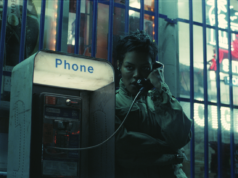My fellow music critics reported feeling tired as early as the second day of the competition, but now it’s all we can do to avoid turning into zombies. We’re gonna need Brad Pitt, Jeremy Renner, and Simon Pegg and his cricket bat to keep control around here. The cops directing traffic outside the hall should probably start shooting us if we show up in tattered clothes with red eyes and muttering, “Brains.” Of course, being classical music critics, we might just as easily be muttering, “Brahms.” If that’s the case, the police shouldn’t shoot us. It’ll be hard to tell the distinction, but when has a police officer’s job ever been easy?
Seriously, it isn’t backbreaking labor, but there is some physical fatigue involved with watching this competition to the extent that I have. Sitting down for six hours and 45 minutes each day is no joke, especially with as little legroom as we have in the hall and chairs that are fast making me appreciate the seats I get in movie theaters. I’ve been dealing with this by watching some of the performances standing up in the screening room at McDavid Studio.
However, the physical fatigue is nothing compared to the mental fatigue of listening to so much piano music at a stretch. I’ve heard stories about Cliburn staffers in previous years going home and shutting themselves away from all noise. I find I’m okay if I listen to any type of music that doesn’t involve a piano, but the other day, I went to the frozen yogurt shop and had to bail out when The Fray’s “How to Save a Life” started playing as background music. I’m also hearing piano music in my sleep, but from my experience at previous Cliburns, I know this is normal at this stage.
Mndoyants’ second recital wasn’t quite as good as his first, but it was still impressive, as Bach’s Toccata in F-sharp minor and Haydn’s Sonata in G major (Hob. XVI: 6) came out clear and fresh. I’m not sure why he chose the Prelude and Fugue in G-sharp minor by Sergei Taneyev, a contemporary of Tchaikovsky’s who wedded a Baroque musical form to his late-Romantic musical style. It was certainly interesting from an academic standpoint, but Mndoyants couldn’t make it any more than that. He did much better with the other esoteric selection on his program, Six Pictures by the 20th-century Armenian composer Arno Babadjanian. I particularly liked the ambling rhythm he established on the second item (“Prelude and Vagarshapat Dance”) and the truculent third item (“Capriccio”) and finale (“Armenian Rhapsody”), whose bass lines sound like boogie-woogie. The chance to hear Armenian piano music is just one reason to come to the Cliburn.
Buratto came out with no jacket, no tie, and a white shirt with a popped collar. Who does he think he is, Cristiano Ronaldo? He plays stylishly, too, as he proved with Bach’s Toccata in C minor and two of Schumann’s Novelettes. The hell of it is, he does have musicianship to go with all the style, as he demonstrated in the quieter sections of Novelette No. 8 in F-sharp minor, pulling back to give greater impact to the piece’s brasher music. I’ve been more thrilled by other pianists here, but I can’t help but admire a guy who carries himself like this and lets the world make what it will of him. You just don’t see flamboyance like this in concert pianists very much. This 20-year-old could still use a bit of experience; the slow movement of Bartók’s Piano Sonata flagged noticeably in his hands. Yet I hope he stays essentially who he is, because I find him fascinating.
Giuseppe Greco (I’m calling him “Joe Greek,” and you can’t stop me) opened up with a Chopin Polonaise-fantaisie that was less vivid than Mndoyants’ in the first phase, though the Italian finished strong. The other item on his program, Prokofiev’s Eighth Sonata, seemed like a brilliant segue, as the lyrical opening sounded uncannily like Chopin in Greco’s rendering. Yet he fell short in the more typical second movement. The composer’s power and pessimistic world-view don’t seem like a natural fit for the pianist, and keeping this massive half-hour sonata together proved to be too much for Joe Greek.
A singularly uninspiring afternoon session kicked off with Poliykov, who today combed his hair so that it stayed out of his face. Unfortunately, my decision to watch this performance from the screening room backfired on me pretty good. The sound was cranked entirely too high (the light fixtures were audibly rattling from the bass notes) before it cut out entirely. What I caught of the performance indicated a fine, restrained version of Liszt’s transcription of the “Liebestod” from Wagner’s Tristan und Isolde. The Ukrainian’s performance of Brahms’ Third Sonata wasn’t up to the same level, though. The slow second movement was pretty, but the fast movements needed more swagger, and the whole piece was unmoving. I’m tempted to say this pianist should perform more Liszt (the short pieces, that is), but I can’t say for sure.
With his beetle brows and his Russian training (unusual for a Taiwanese pianist), the other K. Lin fell woefully short with a ponderous Schumann Humoresque. Would it be too much to ask that a piece called “Humoresque” be played with a trace of humor? Lin Kuan-Ting is a virtuoso who lives to play the notes, but the artistry simply isn’t there yet. His Trois mouvements de Petrouchka was completely limp, lacking surprise and focus, and with more than a few fluffed notes sprinkled in. I’m starting to think that this 20-year-old talent made it to the Cliburn too early.
Abrosimov started off well with three Rachmaninov preludes, and I particularly enjoyed his mordantly funny take on the D minor one. His program however, was built on Prokofiev’s Eighth Sonata as well, and though he was more suited to the idiom than Joe Greek, the piece still came out unfocused, with a particularly monotonous finale. This seems to be just a harder piece to wrangle than the composer’s remorseless Sixth and Seventh Sonatas. The Russian failed.
Sakata came out in the same blue shirt he had in Phase I, but he had some new fans in the audience this time, judging by the reaction. His second program was composed entirely of rarities and obscurities. The first was Mozart’s Duport Variations (K. 573), a work taking an inconsequential minuet by a French contemporary and ringing nine not-much-more consequential variations on it. Sakata played it reasonably well. Book II of Albéniz’ Ibéria showed him off to better advantage. The suite is an impressionistic love letter to the southern coast of Spain, where the composer hailed from. Sakata did particularly well with the infectious rhythms of the “Rondeña” and “Triana,” and he played the piece dryly and with far less pedal than I’ve heard elsewhere. I’d go so far as to call this the best performance of Ibéria I’ve ever heard by a non-Spanish pianist. He concluded with Paul Pabst’s paraphrase of themes from Tchaikovsky’s Eugene Onegin, a cleaner and more direct opera paraphrase than the ones by Liszt that we’ve been hearing in this competition. Sakata took to the opera’s famous waltz well, and showed off what baseball scouts would call filthy stuff in the virtuoso octave passages at the end.
Keep rockin’ those sleeveless dresses, Lindsay Garritson! She came out in a smashing number with a black bodice and a white skirt with a sequined floral design. (I wish I had the fashion background to describe her outfit more precisely.) She played a competent Mozart Sonata in B-flat major (K. 333), but her version of Liszt’s Les jeux d’eaux was sharper and more evocative than McDonald’s last night, with a stronger sense of the melody. I could have used a bit more wildness in her Chopin Ballade No. 4, but she seemed to be saving up for the finale. This was Liszt’s Transcendental Étude No. 8 (“Wilde Jagd,” which translates as “Wild Chase”). Actually, I could have used some more power here, too, but she played it with enough aplomb to rouse the audience from their seats.
Kholodenko began well with a haunting version of Alexander Siloti’s Russian late-Romantic-flavored transcription of Bach’s Prelude in B minor. He then turned in a very-good-but-not-great rendition of Beethoven’s Sonata No. 30, an electrifying piece in the proper hands. He did particularly well with the calming theme from the second movement. Just as I was about to place him on my mental list of deserving semifinalists, though, he came to the fifth performance of Petrouchka that we’ve heard. It had a few wrong notes early on, but it had energy and direction. However, the wrong notes piled up, and it seemed to affect his confidence. The piece lost momentum just when it should have been picking up. I still like him, but now I have to rethink my mental list.












